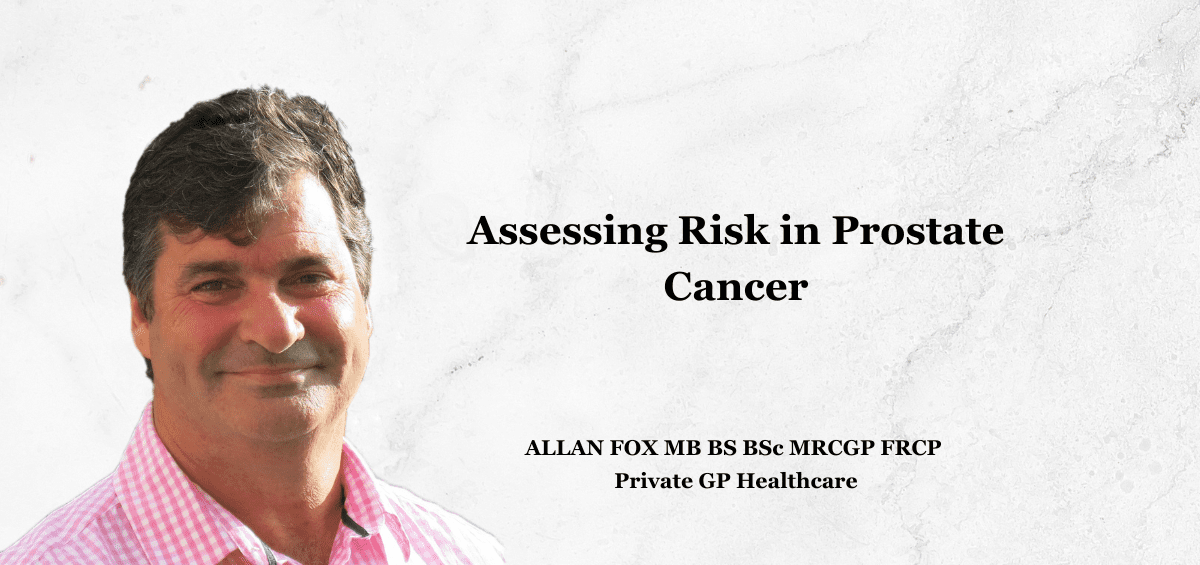When I started in general practice nearly 30 years ago, clinicians were actively discouraged from testing Prostate Specific Antigen (PSA) levels in men. If we did perform the test and the PSA was raised, we were asked to delay referral until it was clear that the prostate cancer has spread. It sounds crazy now! The rationale was that there was no screening system in place and that investigating a raised PSA was as likely to cause more harm than help to a patient.
The reason for this is that PSA alone is not a very accurate measure of whether the prostate gland is benign or contains islands of cancer. If a prostate enlarges, as it does when men age, the PSA rises, confusing the situation further.
Management, even a few years ago, was that if someone had a raised PSA, the prostate was examined with a finger in the rectum (it still is) and a biopsy was arranged. This involved inserting a probe into the anus and taking ten or so biopsies of the prostate, aiming to cover the whole prostate. If cancer was found in the biopsies, the cancer was graded, depending on the activity of the cancer cells, from benign looking to very aggressive looking cancers by a Pathologist with a microscope. The Gleason score that resulted was made of two scores, the first was, what is the dominant grade of cancer and the second, what is the most aggressive grade seen in the prostate.
Based on the Gleason score or if there was evidence the cancer had spread you might have been offered ‘watchful waiting’, regular monitoring of the PSA to detect any rapid rise, radiotherapy, hormone treatment or surgery to remove the cancerous prostate.
Improvements in Prostate Cancer Testing
Things are beginning to move forward slowly in this area. There are now accurate tests to assess the risk that a raised PSA represents significant cancer. These are not yet adopted by the NHS but one of them, Stockholm3, now makes up the national screening test in Sweden. Unfortunately these tests remain expensive and this is the primary reason we have not yet adopted them.
There are two tests available, Stockholm3 which can be used where the PSA is 1.5-20 and Proclarix which can be used when the PSA is between 2-10. Both provide an accurate assessment of the risk of significant disease in the prostate. Stockholm 3 is more expensive at £480, Proclarix is £259. If you wish to have either test we would need two days’ notice to organise a courier to take the sample to the laboratory, the cost of this is included in the test.
Should I Get Screened?
So, under what circumstances should we use these tests? They can be used either as a national screening test to highlight the high-risk patients, by a specialist who can then guide management or by an individual who has concerns about prostate cancer or who has a family history of cancers or of prostate cancer specifically. You do need to have a regular PSA to decide if the test can be done given the PSA ranges, they work with. The test includes the PSA test, but you may find if your PSA falls outside of the range, they will not perform the test, so if you have had a recent PSA it would be useful in your deciding to go ahead with the test.
The test is designed to be used from the age of 45 and up to the age of 75, although if you are fit enough to benefit from treatment at the age of 75 it does not preclude you from having the test.
Treatment for Prostate Cancer
Treatment for prostate cancer has changed to some degree over the years. Radical treatment remains the best option for aggressive disease in the form of radiotherapy or surgery. Some centres are now offering limited surgery using laser, so not all of the prostate is removed. This may improve some of the side effects of surgery like incontinence and loss of erections.
For more benign disease it is reasonable to adopt a watchful approach as many men will die with prostate cancer that is relatively benign, rather than of prostate cancer. Indeed, it is thought that most men over 80 have some low-grade prostate cancer in the prostate. Having a father or brother with prostate cancer doubles your risk of developing the disease.
Hormone Therapy for Prostate Cancer
For cancer that has spread at diagnosis, hormone therapy is used. Prostate cancer is testosterone sensitive so hormones that suppress testosterone are useful at slowing or pausing the disease. There are new developments in the treatment of cancer with drugs that enhance hormonal treatment:
- A group of drugs called PARP inhibitors,
- A type of vaccine and
- A group of drugs called checkpoint inhibitors.
Over time more treatments will appear for this very common cancer.
If you would like a Stockholm3 or Proclarix test do book an appointment to discuss this with me.
Dr Allan Fox, Private GP Healthcare in Canterbury.



Recent Comments